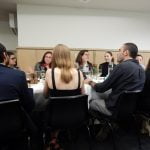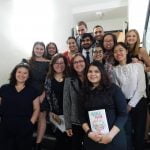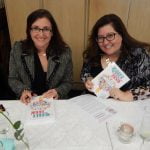Is Your Brain Made of Rubber?
Dr. Sue Morris strides across the room, engaging us with her quick wit and lively lecturing style as she regales the tale of Liam. A hypothetical individual who illustrates the concept of suboptimal thinking, Liam has texted his date after what he thinks was a great night, but receives no response. Assuming the worst — that he did something wrong and will be forever alone — his day spirals into a heap of TV and sadness. Of course, there were other reasons for perhaps why his date did not respond immediately, but he leapt to negative conclusions and wasted his day on the couch. Why? And how many times have you done the same in response to other setbacks in life? Dr. Morris gave us a fitting lesson in how our brains are less clever than we think them, and what we can do about it.
Dr. Morris attended the University of New South Wales for both her undergraduate and postdoctoral studies in developmental psychology. She now teaches at UNSW, where “[her] job is to make students the best versions of themselves,” and has also worked with lecturers to improve engagement with their students. Dr. Morris has received many accolades in her field for excellence in teaching, but her latest achievement lies in the literary realm: her new book, The Rubber Brain: A toolkit for optimising your study, work, and life!, offers advice for changing our mindset in response to the daily challenges life often throws in our face.
While everyone settled into their seats, Mandelbaum House’s first formal dinner of Semester 2 began with Chelsea’s performance of her original song “Robin”, a hauntingly beautiful tribute to her friend who took his own life and a fitting segue into the mental health theme of the dinner. Before steaming plates of salmon and broccolini — the efforts of the great head Chef Robert and his hard-working team — could even be set on the table, residents began peppering Dr. Morris with questions, all of which she answered with passionate enthusiasm. It’s clear that she has found her calling; indeed, when speaking of teaching, she noted that, “it’s [her] favorite thing to do.”
As plates were cleared, Vaibhavi gave a lovely welcome speech before Dr. Morris dove into her talk, eyes sparkling as she described her metaphor of the rubber brain and its importance in a better life. Dr. Morris explained how our brains are much less sophisticated than we humans are prone to believing. Being somewhat slow on the evolutionary uptake, they remain hardwired to look for danger, be on the alert, and use heuristics, or shortcuts, which lead to rapid assumptions about our world. Such activities were helpful when we inhabited caves and hunted while being hunted, but are less useful today, when the most dangerous aspect of our survival is driving to the store for groceries. These habits of the brain lead to “suboptimal thinking,” the kind that prevents us from reaching our goals, achieving a sense of well being, and becoming the best version of ourselves. As with the example of Liam, we tend to see the negative, rather than consider other possibilities for our setbacks. Learning to retrain our brain to be more resilient in the face of challenges — that is, to bounce back, or perhaps deflect the shrapnel of a negative experience — is a step towards improved well being and a happier, healthier life.
Dr. Morris’s talk offered a plethora of useful tips for training our brains to think more optimally, and was an excellent way to start what I hope will be a successful semester for all of us! To learn more, you can purchase here book from here: http://www.aapbooks.com/
By Casey Kuka, Mandelbaum resident








